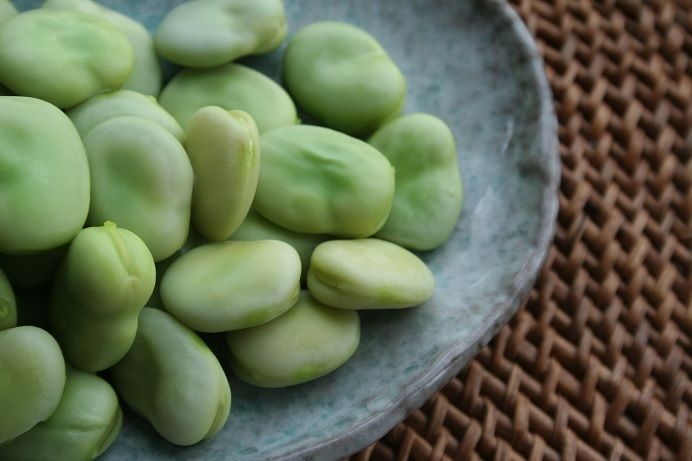|
|
Post by UKarchaeology on Nov 24, 2015 2:10:18 GMT
 REHOVOT, ISRAEL— REHOVOT, ISRAEL— Seeds from fava beans, lentils, peas, and chickpeas have been unearthed at Neolithic sites in the Galilee. “This is an important discovery, enabling a deeper understanding of the agricultural revolution in the southern Near East,” researchers from the Weizmann Institute and the Israel Antiquities Authority said in a press release. The large number of fava beans unearthed at the site of Ahihud, where seeds of a uniform size were found husked and placed in storage pits, suggests that they were the preferred crop as many as 10,000 years ago. These beans could have been used for food and for future crops. “Despite the importance of cereals in nutrition that continues to this day, it seems that in the region we examined (west of the Jordan River), it was the legumes, full of flavor and protein, which were actually the first species to be domesticated,” they explained. Source: www.archaeology.org/news/3903-151123oldest-domesticated-legumes |
|
|
|
Post by UKarchaeology on Nov 24, 2015 2:29:33 GMT
Another article on the matter; Unearthing indicates prehistoric man living in Southern Near East 10,000 years ago preferred legumes in dietIn an important discovery that enables a deeper understanding of the agricultural revolution in the southern Near East, researchers in Israel have revealed that ancient man living in the Galilee area specialized in cultivating legumes in general and fava beans (ful) in particular. Researchers from the Weizmann Institute and Israel Antiquities Authority (IAA) examined fava seeds exposed in archaeological excavations in recent years at Neolithic sites in the Galilee. Their joint research sheds light on the nutritional habits of the people that lived in the area 10,000 years ago. According to the IAA, seeds found at the prehistoric sites show that the inhabitants’ diet at the time consisted mainly of fava beans, as well as lentils, various types of peas and chickpeas. “The identification of the places where plant species that are today an integral part of our diet were first domesticated is of great significance to research. Despite the importance of cereals in nutrition that continues to this day, it seems that in the region we examined (west of the Jordan River), it was the legumes, full of flavor and protein, which were actually the first species to be domesticated," the researchers said. "A phenomenon known as the agricultural revolution took place throughout the region at this time: different species of animals and plants were domesticated across the Levant, and it is now clear that the area that is today the Galilee was the main producer of legumes in prehistoric times," the researchers added. "This is a process that lasted thousands of years, during which certain characteristics of wild species changed, and domesticated plant species were created. To this day, most of the chickpeas grown in the country are cultivated in the Galilee region”. The multitude of fava seeds found at the Neolithic sites excavated in the Galilee during the past few years indicates the preference placed on growing fava beans, the IAA said in a statement. "The dating of the seeds, which was done at the Kimmel Center in the Weizmann Institute, indicated a range of dates between 9,890–10,160 YBP." According to the archaeologists, among their finds were the world’s oldest domesticated fava seeds, dating to 10,125–10,200 according to advanced dating techniques. Source & pics at: www.i24news.tv/en/news/israel/93379-151123-oldest-fava-beans-in-world-discovered-by-israeli-archaeologists |
|
|
|
Post by UKarchaeology on Nov 24, 2015 2:32:26 GMT
And another article; Discovery: Israeli Early Man from 10000 Years Ago Ate Hummus(JNi.media) A joint project of Weizmann Institute researchers and the Israel Antiquities Authority examining fava bean seeds exposed in archaeological excavations in recent years, in Neolithic era sites in the Galilee, sheds light on the dietary habits of people who lived in the area 10,000 years ago. The seeds found in the prehistoric sites indicate that the human diet consisted mainly of fava beans, lentils, various types of beans and chickpeas, the main ingredient in hummus. The presence of many fava bean seeds in excavated Neolithic sites in the Galilee during the past few years is indicative their popularity during that year. The dating of the seeds at the Kimel center of the Weizmann Institute showed a range of dates of about 10,000 years before our time. These seeds, which were found in good condition in the excavations, were kept in storage silos after they had been separated from the shell. The seeds measurements show uniformity in size — indicating organized farming, with harvests when the beans reached maturity at the same time. According to the researchers, storing the seeds in silos is also indicative of long-term agricultural planning, when the seeds were being saved not only for food, but also to ensure future crops for the coming years. Full story: www.jewishpress.com/news/breaking-news/discovery-israeli-early-man-from-10000-years-ago-ate-hummus/2015/11/24/ |
|